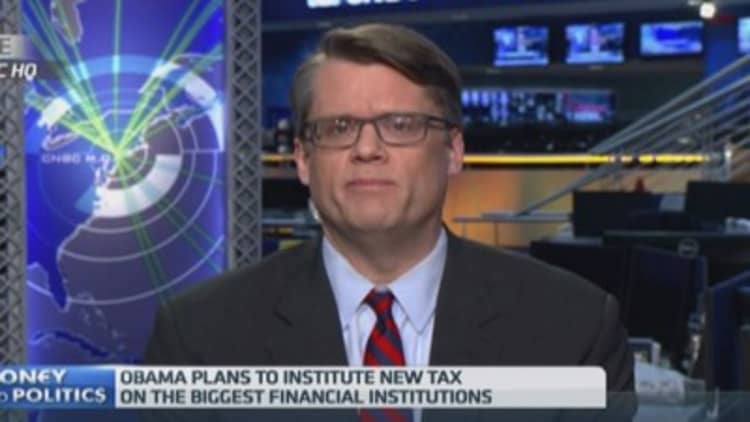
President Barack Obama delivers his penultimate State of the Union on Tuesday night and will attempt to achieve two central goals: further associate himself with the recovering U.S. economy and tilt the Democratic Party toward a populist platform for 2016 that embraces higher taxes on the wealthy designed to boost middle-class incomes and chip away at economic inequality. The specifics of Obama's proposals—from the bank tax to the capital gains hike—don't matter so much as the Republican Congress will almost certainly reject them.
But the broad themes matter very much—both to Wall Street and the broader political system—as the 2016 presidential race takes shape. Democrats hope to harness the positives of the Obama economy—lower unemployment and faster growth—while putting together a plan for the negatives, which include stagnant median incomes and a shrinking labor force. The speech, scheduled for 9 p.m. EST, is intended to put the GOP on the back foot on taxes and the economy and force them to come up with alternatives that are not just more across the board tax cuts.
So far at least, it does not seem like Republicans have a strong answer to Obama's proposals, which the White House strategically put out over the weekend to dominate coverage leading up to the speech.
Read MoreCalculating the long odds for Chris Christie
Mitt Romney, the 2012 GOP nominee who is looking at a 2016 bid, attempted to shift to a populist tone in remarks to Republicans in San Diego on Friday. But his efforts drew mostly mockery on social media from Democrats and Republicans who remember Romney's comments deriding the "47 percent" of Americans who rely on government largesse rather than contribute to economic growth. Romney, a private equity multimillionaire, is not the ideal vessel for a populist message of economic inclusion.
Meanwhile, Obama in his speech will be attempting to gain the high ground in an effort to address the biggest economic failing on his watch, the fact that median household incomes actually fell close to 4 percent to $51,939 in 2013 compared to when Obama took office in 2009, according to census data. The numbers for the lowest earners are even worse.
Much of this is the result of larger economic trends—and fallout from the recession—that are beyond Obama's control. But his rising poll numbers won't truly take off unless economic gains are more broadly felt.
None of Obama's proposals—from a hike in the capital gains rate to a tax on the 100 largest banks to free community college—is likely to become law in a GOP Congress. But they will put pressure on Republicans to address inequality through something other than just across-the-board tax cuts that also benefit the already very wealthy. How Republicans deal with this issue will be a major theme of the 114th Congress and the 2016 presidential campaign.
There remains an outside shot that the two parties could agree on some form of corporate tax reform in 2015. But it will be hard for Republicans to push an overall cut in the top rate of 35 percent without adding elements that would benefit working families, particularly if Obama continues to gain ground politically with his latest populist push.
Read MoreProgressive Democrats and the 2016 conundrum
If Republicans decide they need to cut a deal, some of what Obama proposes Tuesday night could find its way into a tax reform package. The odds are long but it's not impossible.
If they don't look to make deals, Republicans could instead wind up spending their time beating back popular Obama proposals like the bank tax—which appeared in a previous bipartisan tax reform plan—and the capital gains increase without having a robust agenda of their own. It is not clear that further efforts by Republicans in Congress to target Obama's health-care and financial-reform laws or to further cut spending will gain much traction with the electorate.
Republicans now dominate Congress, but their overall approval rating is well below Obama's and they face a challenging landscape in 2016 to hold onto the Senate and regain the White House after an eight-year absence. Obama on Tuesday night hopes to make that quest even harder.
—Ben White is Politico's chief economic correspondent and a CNBC contributor. He also authors the daily tip sheet Politico Morning Money [politico.com/morningmoney]. Follow him on Twitter @morningmoneyben.


